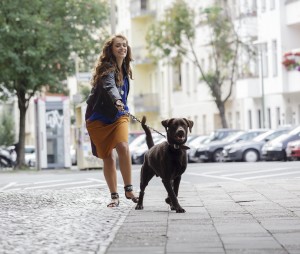City Cats and Cosmopolitan Canines: Keeping City Pets Safe
 From the clamor of our favorite deli to the all-night-lights of the city, residing in an urban area can be thrilling for humans. Unfortunately, the fast-paced urban life we enjoy can present challenges to maintaining our city pet’s well-being and safety.
From the clamor of our favorite deli to the all-night-lights of the city, residing in an urban area can be thrilling for humans. Unfortunately, the fast-paced urban life we enjoy can present challenges to maintaining our city pet’s well-being and safety.
Increased traffic puts many pets at greater risk for getting hit by a car. More people living in a concentrated area can also be equated with dangers such as access to potential toxins, open garbage cans, and city-dwelling wildlife. High-rise apartments also present the risk of injuries from falls, and newer homes and apartments often lack suitable enclosed areas for safely exercising our pets.
But, we can take some steps to make life in the city more pet-friendly, while increasing our pet’s safety in such a fast-paced, people-filled environment.
Pets in the City – Safety Tips
- Keep pets indoors. While some pet parents resist this safety measure when it comes to roaming felines, your pet has a much better chance of staying safe, free from disease, and actually living a longer, healthier life by being kept indoors.
- Refrain from leaving dogs unattended. Pet theft is always something to be vigilant about, especially if you have a pure-bred animal or small dog that is easy to pick up and walk off with. Supervision reduces both the chances of theft and the risks associated with escape (never doubt your dog’s digging skills).
- Microchip your cat or dog. Microchipping your pet is, by far, the best safety measure you can take. ID tags are also recommended as a fast visual cue to an animal control officer or neighbor who happens to find Fluffy or Rex wandering around. Maintain up-to-date contact information for both ID tags and microchips.
- Invest in professional obedience training and socialization for canine fur-kids. So many bites, fights, and lost pets can be linked to a lack of basic social skills and training. Before taking your dog on a leash or to the dog park, ensure he or she understands and responds to basic commands, such as “sit”, “stay”, “drop it”, and “come”.
- If you live in a multistory building, make sure balcony doors remain closed and windows secured if possible. Don’t make the assumption that a screen will suffice. Hundreds of cats fall out of screened windows each year, since they will often choose to sleep up against or lean on attached screens. They’re made to pop off, and are certainly not secure enough for your kitty’s weight or curiosity.
- Keep an eye on pets while out on a walk or in the yard. There are numerous toxins your pet could accidentally consume – everything from pigeon poop, which contains the fungal organism Cryptococcus, to a puddle of antifreeze left in a driveway. There are also numerous poisonous indoor and outdoor plants all around yards, hedges, and park paths. Since it’s unlikely you will memorize every poisonous species, it’s a good idea to simply discourage your pet from attempting to taste a possible toxin.
- Of course, you are likely one of thousands of people in the region who have a precious pet. When out on walks or in the park, ask a pet guardian if it is OK to approach with your pet before doin so. To prevent your pet’s susceptibility to contagious illnesses, such as Bordatella (‘kennel cough’) or parasitic infections, make sure your pet has been fully vaccinated and is taking all recommended seasonal preventatives.
Life is in the city need not prevent you from having a wonderful, social time with your pet. However, by taking a few simple precautions, your pet will remain safe and secure and you’ll be the city-savvy pet guardian.


